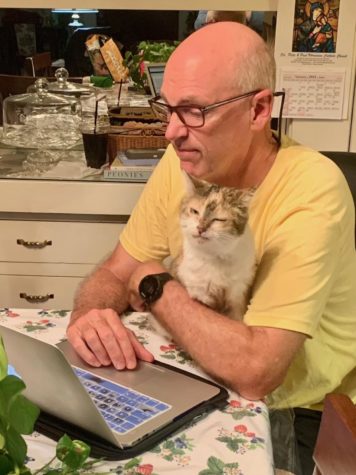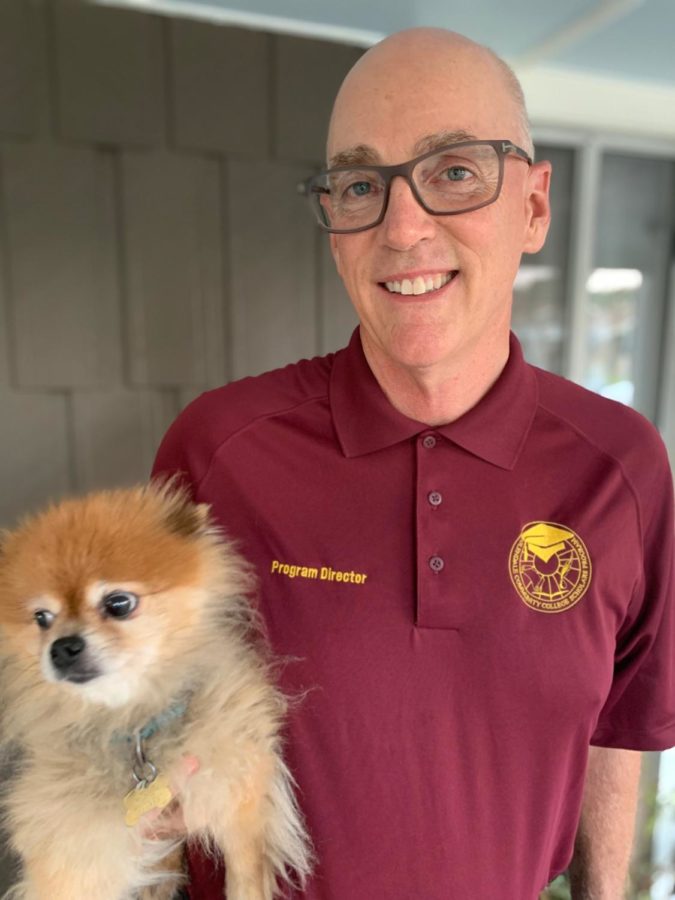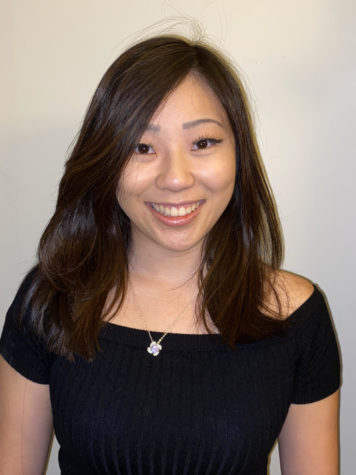Dedicated Professor and Scholars Program Director on a Mission to Cultivate Compassion
Q&A with Dr. Michael Harnett
With the challenges of the pandemic and a news cycle that demonstrate the inhumanity people are capable of, many are experiencing an extremely difficult time finding hope and the motivation to remain positive and inspired. People are encountering and coping with numerous losses and hardships in different forms. To provide hope and inspire others to be the best versions of themselves during these challenging times, the “Compassion Column” was designed by Jacqueline Kamei to highlight faculty, staff, students, programs, organizations, and events on campus and in the surrounding communities that demonstrate compassionate behavior. Articles will be published in this series intermittently for at least the duration of one year.
The first article of this new series features Dr. Michael Harnett, a dedicated professor of English, humanities, and educational psychology and the GCC Scholars Program Director, who has been on an ongoing mission to help bring out the best in others and build a kinder world by acting with compassion. Dr. Harnett incorporates compassion into not only his teaching methodologies but also within the Scholars Program, which works to create benevolent members of society. In an in-person interview with Dr. Harnett, he explained how compassion has become a part of his life and how he does his best to cultivate compassion in his students.
Q: As the Director of the Scholars Program, how do you incorporate compassion into the Program’s values and work?
A: Scholars is about the development of the well-rounded person, not just an honors program with honors classes and that’s it. So the first thing that often comes up in any honors program is they’ll often have a community service component. Community Service really is about helping people in the community, serving others, extending yourself to others, and thinking about others needs, seeing as college is honestly so often a very self-centered enterprise. We’re thinking of choosing our own major, we’re thinking of our transfer, our success, what will help me be successful, what will help me build my résumé. And so the starting point is, well, how about thinking about other people, so serving the community, serving the campus community is a part of it. The social events are about interacting and just having a fun time with other people, again to support them and include them. We see that one person off to the side; we ask them to join us as we’re playing a game or we’re doing some activity. … And it’s not about the rewards, it’s not about the credits, the requirements, the GPA, it’s just about being a complete person. So it’s a lot more work than a lot of honors programs do, but I think it’s worth it.
Q: What events in the Program demonstrate the value of giving to or helping others?
A: Well certainly Community Service is all about that. We have the Love Our Elders event coming up, and just writing a simple note to somebody that’s lonesome and could use some encouragement, that’s part of it …. But really any of the meetings and events is what that’s all about. Getting together, not just being an individualist “take take take” but instead, giving and sharing and contributing for that greater good and maybe encouraging people by just being present and smiling and listening and being willing to contribute to that person’s well-being is what all the events are about. And I would say Fundraising, Outreach, the Arts and Culture, the Social Events, the Community Service, all of them are in that vein of “we’re not alone in this; we’re in this all together.” Especially these days with remote instruction and having to be so separated all the time; this is a time to get together.
Q: Whenever you refer to the Scholars, you have been known to say “Hello, Good People!” What was the inspiration behind this greeting?
A: I would say the inspiration of this is my dad. My dad is a very outgoing person, just a fun loving person, made the most out of every occasion. He would go up to people that he didn’t know, he would go up to people that he did know, and it would be this big husky “Hello!” And he’d say, “How are you happy people?” And I adapted it for my own. I think we should do our own personality…. And so I changed it to “Hello, Good People.” And there’s like a little offer there to be a good person because I just called you one. … I just assume of course you’re a good person; you’re here. We’re all brothers and sisters and all for the good.
Q: How do you incorporate compassion into your own teaching methodology? 
A: To answer the question further about how I at least attempted to develop compassion in my teaching, I had to go back to remembering how I have always been very shy and was really terrified about speaking in public…. But when I got in front of a class and realized that they were depending on me and that nothing happens if I don’t make things happen, … I changed my focus from my shyness, which I think is inherently selfish, to thinking about the needs of the group, the students, how I can help them, how I can encourage them, how I can challenge them, how the whole dynamic can be altered for the better.
… And just … make it clear that … I value everybody’s input; that they make the class, that it’s not my class, it’s your class, and I’m just here to help facilitate things and maybe to inspire people by maybe showing some example like “See, this is what other people did, now you can do it. And of course you can do it.” And that goes into feedback on essays. The feedback shouldn’t be, “This is my harsh evaluation, and this is terrible or even this is good.” It should be, “You’re doing it. Here’s the thesis. Here’s the support. Here’s the organization. Here’s the expression. Here’s what you could do next in improving.” But there’s something to validate here, and I value everybody as a person. The guiding assumption in all of the work I’ve done on motivation, it’s all about, of course, you can do it! I just have to find a way to tell you that so that you do it, and then you know you can do it.
Q: Who and/or what were your sources of inspiration to treat others with compassion?
A: Certainly my parents. My dad’s mom and dad would frequently take in people at their house and rent rooms and sometimes just have people stay for free. Always somebody in the neighborhood would come by for dinner. My other grandparents, my mom’s parents, would always have a soldier over during the war on Sunday evenings for dinner. … Teachers were like that, too. Many of my elementary school teachers especially, some through high school, [and] some in college, were just really giving people, And I saw that and … really value that. And church, I grew up with a strong religious background. I read stories that were parables and teachings about “Your goal is to be a good person.” So that was a heavy, heavy influence. And then as I started teaching, I realized it’s not about me and my little kingdom of the classroom; it’s about this chance to really hopefully do some good for people. That’s the ongoing quest. I’ve been doing it since 1986, and hopefully I can learn eventually.
There was a professor …the late, great Leonard DeGrassi, and I taught with him for eight years in this Humanities 120 class, which was literature and the cultural arts. … Wonderful, brilliant person, but, better than that, kind person. I was working on my dissertation and he gave me a little card. And it had Saint Anthony of Padua on it, a little prayer I could do that said just remember you are on your way, you’re going to do this. And he had many funny things he would say that would just make me realize how to keep things in perspective. So he was somebody that I admired and was really lucky to have as a friend…. I’m hoping to live up to [that] kind of kindness…. He could read and write Egyptian hieroglyphics. He could tell you about any work of art that has ever been produced in the Western tradition and, at the same time, had this great kindness and enthusiasm for people. He taught with me well into his 80s and just an amazing person.
Q: Why do you think practices of compassion, altruism, and kindness are important to society as a whole?
A: I think the simple reason is because that’s when society as a whole and individuals in particular can rise to their best. That’s when people are at their best. In Maslow’s hierarchy, self-actualization is the highest level, but what Maslow meant by self-actualization was then being in a position to help others. So that is the highest we can be. It is really important, especially these days with wars going on and disease and things separating us, we need something that bands us together, and that is what it is. Love is stronger than hate. … That kind of compassion and altruism is what can save us.
To learn more about the Scholars Program, visit: https://www.glendale.edu/academics/special-programs/scholars-program
Jacqueline Kamei can be reached at [email protected].


